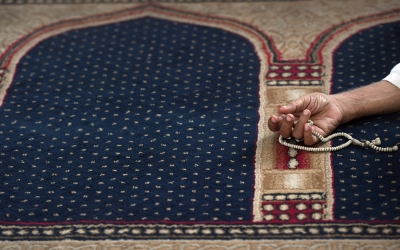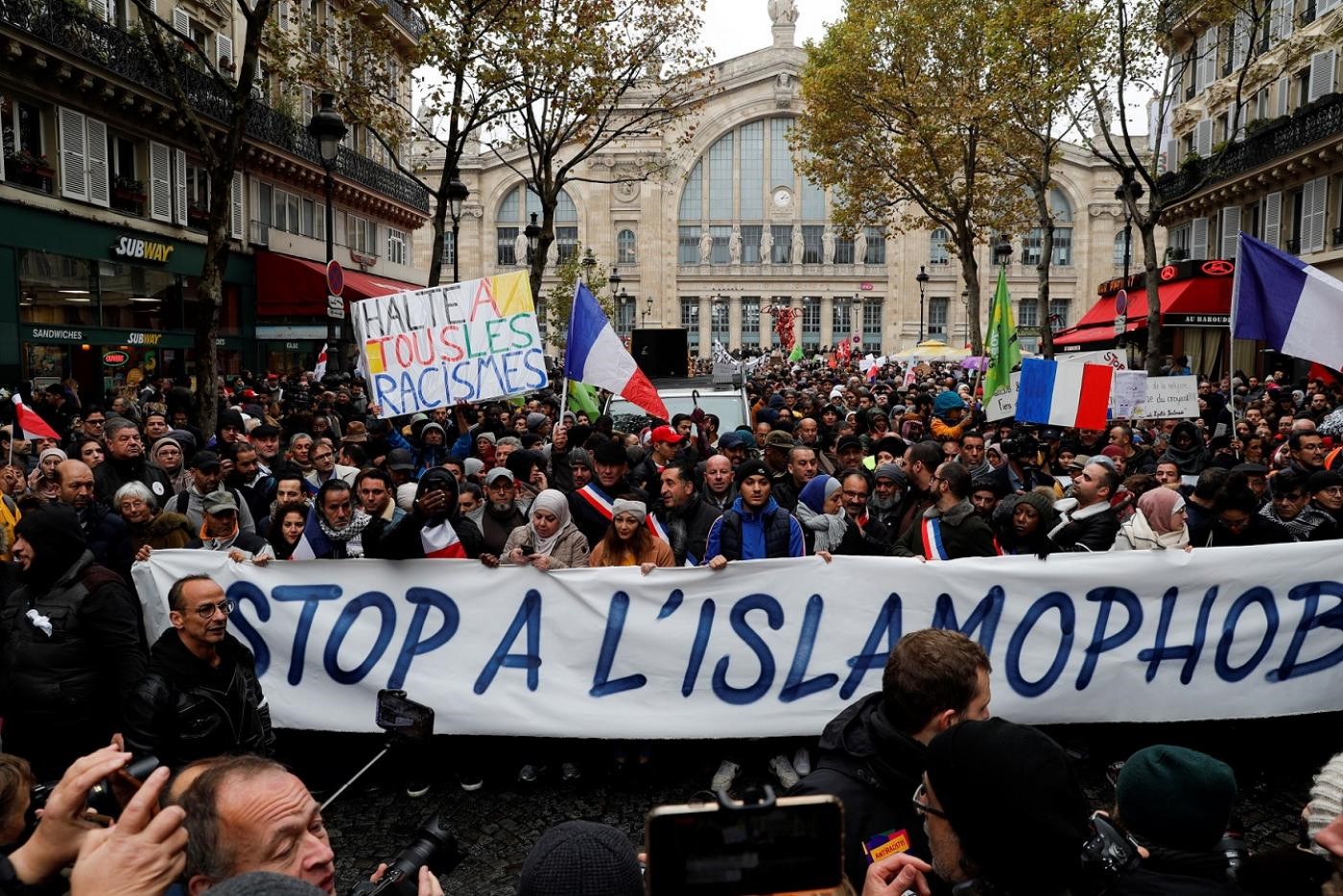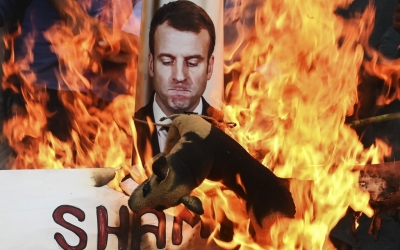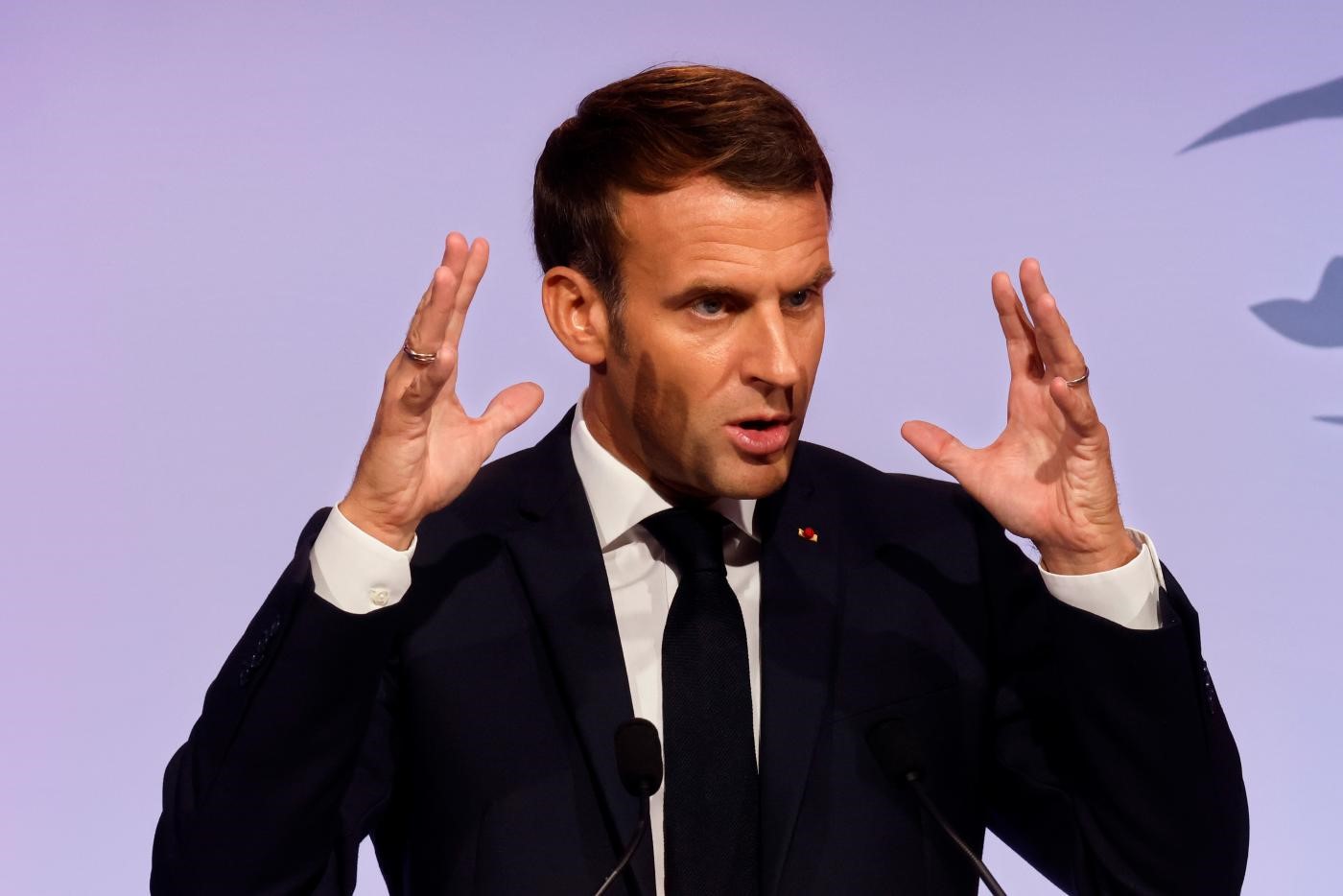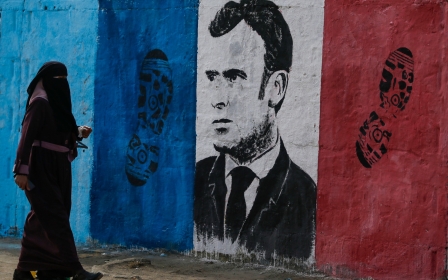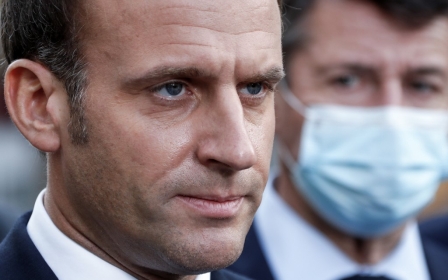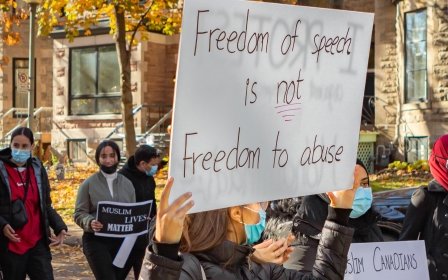France's state-sanctioned Islamophobia is the biggest threat to the republic
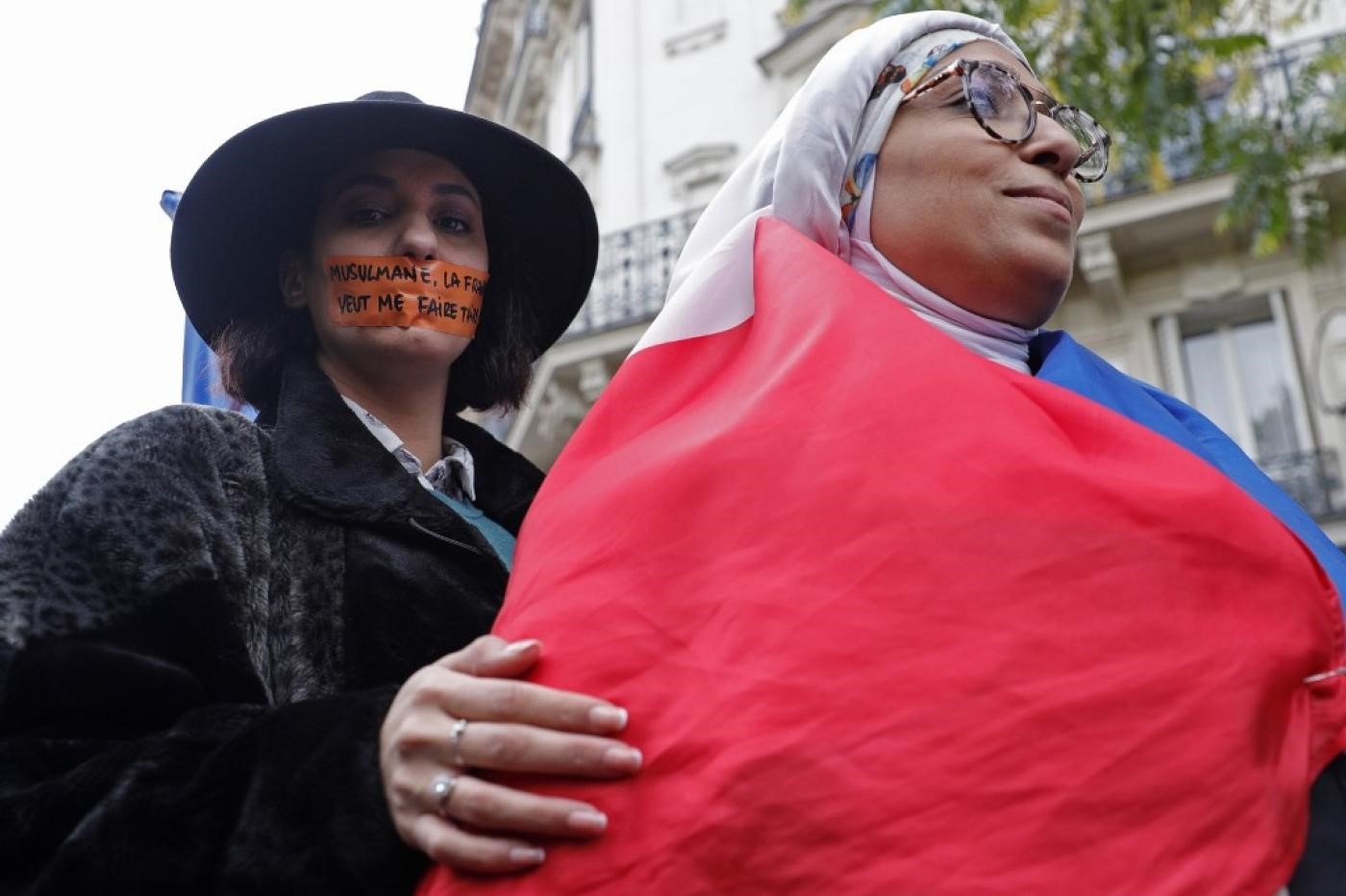
What has been happening in France since the horrendous decapitation of history schoolteacher Samuel Paty in front of his own school in Conflans-Sainte-Honorine?
France’s overreaction to that murder has been precisely what the terrorists themselves were hoping to trigger. Such misguided reactions must be exposed for playing into the hands of the jihadists and for making the "France of human rights" cross a dangerous threshold.
It is becoming increasingly obvious that the French president's decisions are now motivated primarily by a pitiful electoral competition between himself and the far right.
Macron's decisions are now motivated primarily by a pitiful electoral competition between himself and the far right
The rhetoric of Islamophobia, which conflates Muslims and terrorists and plays on suspicion, ignorance and fear towards the former, was for a time confined to the ranks of the far right. It then inexorably propagated itself among the governmental conservative parties, before it contaminated whole swathes of the "laicist" (secularist) left, then as now in a situation of historical defeat more severe than simply losing elections.
This paradoxical left-wing paradigm of French Islamophobia was for a time the trademark of a "satirist" weekly whose DNA used to be generalised provocation - before it joined forces with the Islamophobic left. In the aftermath of the Conflans-Sainte-Honorine attack, that paradigm is now being sanctified by the French state itself at its highest levels.
New MEE newsletter: Jerusalem Dispatch
Sign up to get the latest insights and analysis on Israel-Palestine, alongside Turkey Unpacked and other MEE newsletters
Obscene caricatures of utmost vulgarity, stripped of any humour or meaning other than the desire to relentlessly insult, humiliate, and degrade the most vulnerable and least politically represented segment of French society (Muslims) have now become, for France’s head of state and the "laicist" elites of the "Republic", the sacrosanct symbol of French-style freedom of expression.
And it is through France's president himself that the rhetoric of the indiscriminate stigmatisation of Muslim believers is explicitly endorsed and elevated to the rank of an authentic republican principle.
The sectarian ideology of the 'Republican Winter'
This rhetoric is borrowed wholesale from an over-publicised fringe group misleadingly called the "Republican Spring", where a few of the defeated and losers of the left have found refuge.
There, with the alibi of the defense of laicite which they themselves grossly distort, they have been insidiously propagating the most sectarian themes and cliches used by their former adversaries on the right.
In the wake of the theories of Bernard Lewis (the inventor of the "Clash of Civilizations", whose popularity among the American neo-cons is well known), and in line with the insinuations long since adopted by Gilles Kepel and his colleague Bernard Rougier, the range of Muslim and non-Muslim targets of French republican opprobrium has been dramatically expanded.
Now, it is the French state itself that is lending credibility to the much-contradicted, never proven theses of an "Islamist ecosystem", a pseudo-scientific equivalent of the myth of "no-go zones", essentially a reformulated version of the old narrative of the "Islamisation of Europe".
According to these theories, like a "conveyor belt", these "ecosystems" that are allegedly "controlled by Islamists" and essentially located in France’s poorer housing projects and suburbs, supposedly constitute the "breeding ground of jihadism". Such "enclaves" within the republic purportedly push towards violent terrorist extremism those Muslims who insist on preserving a certain visibility for their cultural and religious identity in the public sphere or those among them who articulate an oppositional political discourse.
Fear and anxiety
Capitalising on the now thoroughly debunked cliches about "Islamist no-go zones" and the so-called Islamised "lost territories of the republic" that have saturated media and political discourse for literally decades, this "school of thought" about Islam and Muslims in the West, best represented by Rougier and Kepel, deploys the rhetorical register of fear and anxiety in the face of a supposed existential threat that is conveniently and crudely expressed by the latest –ism of the day (jihadism, Islamism, Salafism, extremism, communitarianism - and now "Islamist separatism").
Amid a complete void of statistical data that might allow one to - even roughly - measure and assess the phenomena that they hype and exaggerate (often on the basis of a handful of anecdotes and hearsay gleaned here and there), what these public intellectuals actually describe in their alarmist rhetoric are the dysfunctions of the French republic and society itself, and the consequences of those dysfunctions - far more so than some “Islamist conquest” strategically planned from abroad.
Though it is not their aim, they merely confirm that France’s stigmatisation and marginalisation machine has itself created social ghettos for Muslims in the French banlieues.
The root causes
As a direct result, counter-cultures (religious or otherwise) that are estranged from mainstream society and their national environment can occasionally emerge in those marginalised, deeply impoverished, and largely abandoned banlieues.
But, with appalling irresponsibility and blindness, this "research", including Rougier’s hyper-publicised latest book, usually omits lucid investigation of the actual and multiple root causes of these oppositional counter-cultures. More so, it omits the grave and ongoing responsibilities of the French republic itself, preferring instead to put the blame solely and squarely on the shoulders of "Salafists", "Islamists" and their "ideology".
Ironically, none other than President Macron himself correctly identified these root causes and responsibilities in his now-famous les Mureaux speech on 2 October - before forgetting it all, as we now witness in his purely repressive policies.
As he very fleetingly acknowledged: "We have ourselves built up our own separatism. The separatism of our suburbs and housing projects, the ghettoisation that our Republic... allowed to develop... we have built up a concentration of impoverishment and hardships.... We have concentrated educational and economic difficulties in certain areas of the Republic… We have thereby ourselves created neighbourhoods where the promises of the Republic are no longer fulfilled."
In France, the influence of "ambient jihadism", or djihadisme atmospherique (an "atmosphere" that supposedly fosters "hatred for the values of western secular societies" according to Kepel) is thus no longer portrayed as being limited to radicalised fringe populations or spaces (some of France’s banlieues etc). Through such pseudo-sociological (but genuinely Islamo-paranoid) ideological "concepts" as "Islamist ecosystem" or "atmospheric jihadism", one could easily consider that such "ambient" jihadism is de facto propagated by nearly all practicing Muslims.
This radical expansion of the "jihadist threat" has been prepared for years by the 24-hour news channels (from CNews, the French equivalent of Fox News, to LCI and BFMTV) that, since the first "headscarf affairs" of October 1989, have echoed and amplified, in panic mode, such analytical and ethical nonsense - to the point that France has now reached a stage of collective hysteria against not just “Islamists”, but Islam and all Muslims.
However, the threshold that has just been crossed is considerable: from a conventional right-wing Islamophobia, in October and November 2020 France has truly adopted what may be termed as a "state Islamophobia" that is almost unique among the historical core of the European Union.
The law on "strengthening laicite", initially presented as a fight against "Islamist separatism" before being renamed "Law for the consolidation of Republican principles", and, more generally, the identification of the origins and causes of terrorism, no longer targets only those fringe extremist groups or individuals who are "guilty" of oppositional speech, of a lifestyle or a belief or value system at odds with the dominant mores and norms that prevail within "the republic".
What the government is now targeting is the entire infrastructure of NGOs, associations, sports clubs, commercial operations, and humanitarian organisations (Baraka City was dissolved on 28 October in a Cabinet meeting).
Borrowing a page from the book of the likes of Egypt’s Sisi, Macron is even dissolving (furthermore, through merely administrative and not court rulings) those which, like the CCIF, specialise in the defence of the human and legal rights of Muslim victims of Islamophobia.
Dissolving the CCIF: A counterproductive measure
The instant paradox of this radical turn is that it now targets the Collective Against Islamophobia (CCIF), whose dissolution on 19 November was explicitly telegraphed. But that NGO, which has been described as "one of the rare few.... French Muslims truly trust", is actually one of the very few that is able to limit the counterproductive setbacks that the French government’s brutal radicalisation is currently provoking.
Founded in 2000 by Samy Debah and for many years headed by the charismatic Marwan Muhammad, who explained the significance of his social commitment in a book, We (Too) Are the Nation, the collective was created "because the traditional anti-racist organisations [such as the International League Against Racism and Antisemitism] did not recognise or understand the reality and the specific mechanisms of Islamophobia."
With a remarkable effectiveness recognised and praised by human rights organisations and institutions including the European Court of Human Rights and the OSCE in its hate crime reports, the collective is dedicated to documenting and exposing Islamophobic acts, offering legal help including counselling and court representation for Muslim victims, producing studies, and organising collective action in order to "counter the hate speech and climate of suspicion fostered by certain media and public figures".
Short of being able to cancel its free speech pure and simple, France's rulers are now trying to force the Collective Against Islamophobia into exile abroad
The accusations long levelled against the NGO -including that the collective "helps Isis recruit jihadists" - are absurd and outrageous.
They have no credibility whatsoever. The "evidence" produced by the French authorities for their grave accusations essentially consists of banal critical and oppositional declarations ascribed to members or supporters of the CCIF or people appealing to it, or that some "radicalised" individuals were aware of the collective's very existence.
The French government's initiative furthermore glaringly contradicts the ideal of "freedom of expression" and of opinion that the CCIF accusers nonetheless consistently claim to uphold to justify the boundless stigmatisation of the Muslim community.
Those civil liberties should indeed remain the foundation of a democratic republic worthy of the name. Yet, short of being able to cancel its free speech pure and simple, France's rulers are now trying to force the Collective Against Islamophobia in France into exile abroad.
Hostile behaviour
Such hostile and unjustifiable behaviour could not be more counterproductive to their stated goals: in order to fight a problem - the propensity of a tiny number of fringe individuals who may be ready to escalate their political causes into armed militancy - the French government is paradoxically suppressing precisely those associations and NGOs that have demonstrably constituted obstacles and firewalls against the dissemination of violent extremism.
How would France react if the governments of certain central European countries targeted NGOs fighting antisemitism the way France is now targeting those fighting Islamophobia?
Would France have banned trade unions to fight anti-capitalist terrorism?
What would have happened if in the 70s and early 80s, in order to fight anti-capitalist terrorist groups such as Action Directe, the French republic had attacked and tried to ban the Confederation Generale du Travail (CGT), Force Ouvriere (FO), and the entire workers’ union infrastructure of the country under the pretext that these criticised the bosses and managers in terms similar to those of the leftist terrorist groups?
How would France react if the governments of certain Central European countries targeted NGOs fighting antisemitism the way France is now targeting those fighting Islamophobia?
The worst of this new French "strategy" is that it clearly heightens the appeal of the likes of the Islamic State. This strategy lends credibility to the old accusation levelled by those jihadist groups that France is systematically hostile towards Muslims including her own citizens - a charge that Paris finds increasingly hard to counter, and not just in the Muslim world.
Despite the French president's tedious and largely ineffective denials in his recent damage-control operation towards the Muslim world, where anger has turned into a commercial boycott, an old foreboding has in some sense become a reality: increasingly, the only Muslims considered compatible with the Macronian republic appear to be those who are no longer Muslims.
In France's recent history, probably no presidential campaign (or pre-campaign) will have done more damage to the present, short- and long-term future of its citizen-voters, of all religions and none.
The views expressed in this article belong to the author and do not necessarily reflect the editorial policy of Middle East Eye.
This is a translation of an article that originally appeared in the MEE French edition.
Middle East Eye delivers independent and unrivalled coverage and analysis of the Middle East, North Africa and beyond. To learn more about republishing this content and the associated fees, please fill out this form. More about MEE can be found here.



